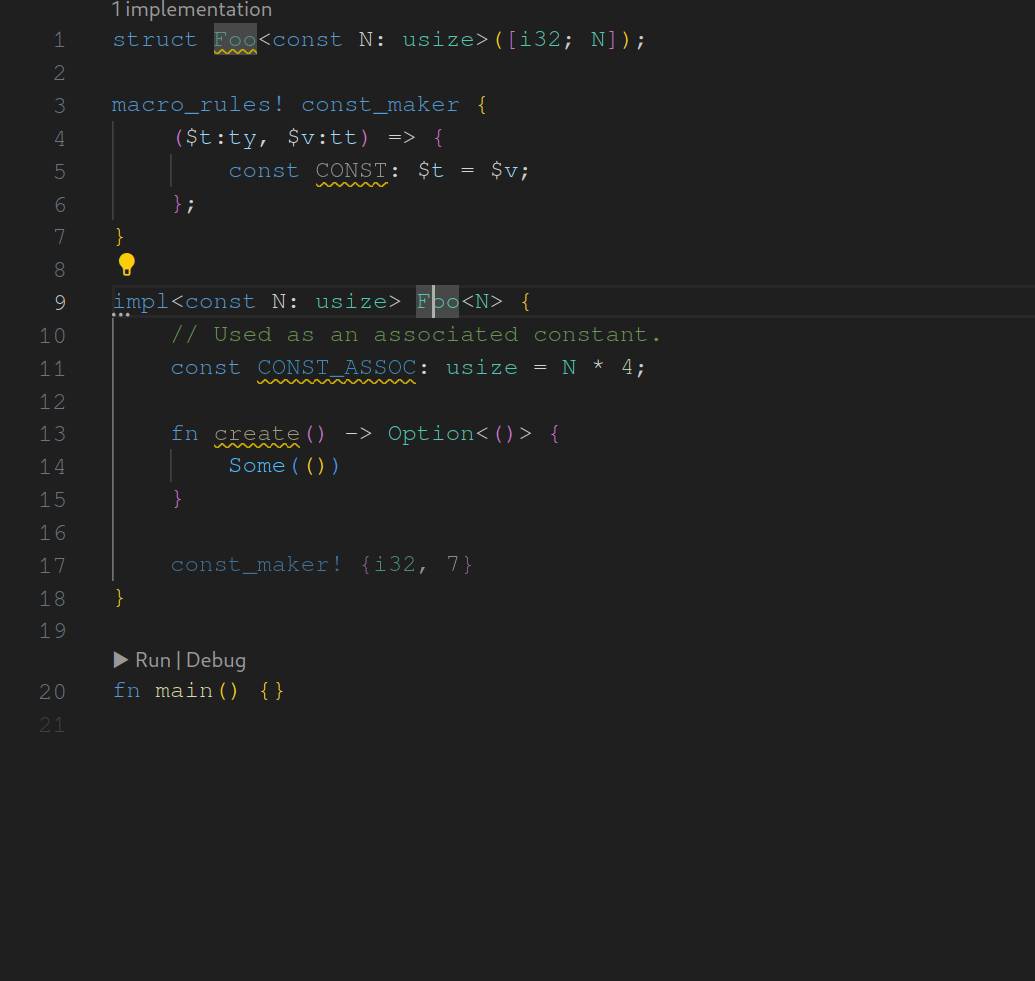Don't show `unresolved-field` diagnostic for missing names
I don't think reporting ``"no field `[missing name]` on type `SomeType`"`` makes much sense because it's a syntax error rather than a semantic error. We already report a syntax error for it and I find it sufficient.
editor/code: Enable `--noUncheckedIndexedAccess` & `--noPropertyAccessFromIndexSignature` ts option
This enables typescript's these option:
- [`--noUncheckedIndexedAccess`](https://www.typescriptlang.org/tsconfig#noUncheckedIndexedAccess)
- This checks whether indexed access is not `null` (or `undefined`) strictly just as like checking by `std::option::Option::unwrap()`.
- [`--noPropertyAccessFromIndexSignature`](https://www.typescriptlang.org/tsconfig#noPropertyAccessFromIndexSignature)
- This disallows `bar.foo` access if the `bar` type is `{ [key: string]: someType; }`.
----
Additionally, to enable `--noUncheckedIndexedAccess` easily, this pull request introduces [option-t](https://www.npmjs.com/package/option-t) as a dependency instead of defining a function in this repository like `unwrapUndefinable()` .
I'll remove it and define them byself if our dependency management policy is that to avoid to add a new package as possible.
assist : generate trait from impl
fixes#14987 . As the name suggests this assist is used to generate traits from inherent impls while adapting the original impl to fit to the newly generated trait. I made some decisions regarding when the assist should be applicable. These are surely open to discussion. I looking forward to any feedback.

Disable remove unnecessary braces diagnotics for self imports
Disable `remove unnecessary braces` diagnostic if the there is a `self` inside the bracketed `use`
Fix#15191
Support GATs in bounds for associated types
Chalk has a dedicated IR for bounds on trait associated type: `rust_ir::InlineBound`. We have been failing to convert GATs inside those bounds from our IR to chalk IR. This PR provides an easy fix for it: properly take GATs into account during the conversion.
Map our diagnostics to rustc and clippy's ones
And control their severity by lint attributes `#[allow]`, `#[deny]` and ... .
It doesn't work with proc macros and I would like to fix that before merge but I don't know how to do it.
internal: Format let-else
As nightly finally got support for it I went ahead and formatted r-a with the latest nightly, then with the latest stable (in case other stuff changed)
Split out project loading capabilities from rust-analyzer crate
External tools currently depend on the entire lsp infra for no good reason so let's lift that out so those tools have something better to depend on
Clean up `ImportMap`
There are several things in `hir_def::import_map` that are never used. This PR removes them and restructures the code. Namely:
- Removes `Query::name_only`, because it's *always* true.
- Because of this, we never took advantage of storing items' full path. This PR removes `ImportPath` and changes `ImportInfo` to only store items' name, which should reduce the memory consumption to some extent.
- Removes `SearchMode::Contains` for `Query` because it's never used.
- Merges `Query::assoc_items_only` and `Query::exclude_import_kinds` into `Query::assoc_mode`, because the latter is never used besides filtering associated items out.
Best reviewed one commit at a time. I made sure each commit passes full test suite. I can squash the first three commits if needed.
internal: Add analysis-stats flag to trigger some IDE features
Closes https://github.com/rust-lang/rust-analyzer/issues/15131
Running this on r-a showed an 86mb memory increase, but that was without running it on the deps, will try that later when I don't need to use my pc.
Shuffle some proc_macro_expand query things around
Removes some unnecessary extra work we are doing in proc-macro expansion, and more importantly `Arc` the result of the proc_macro_expand query, that way we can reuse the instance for the `macro_expand` query's result
feat: don't add panics to error jump list by default
To re-enable this, use
"rust-analyzer.runnables.problemMatcher": [
"$rustc",
"$rust-panic"
],
setting.
closes: #14977
Add `-Zremark-dir` unstable flag to write LLVM optimization remarks to YAML
This PR adds an option for `rustc` to emit LLVM optimization remarks to a set of YAML files, which can then be digested by existing tools, like https://github.com/OfekShilon/optview2. When `-Cremark-dir` is passed, and remarks are enabled (`-Cremark=all`), the remarks will be now written to the specified directory, **instead** of being printed to standard error output. The files are named based on the CGU from which they are being generated.
Currently, the remarks are written using the LLVM streaming machinery, directly in the diagnostics handler. It seemed easier than going back to Rust and then form there back to C++ to use the streamer from the diagnostics handler. But there are many ways to implement this, of course, so I'm open to suggestions :)
I included some comments with questions into the code. Also, I'm not sure how to test this.
r? `@tmiasko`
Don't specify proc-macro-test version
proc-macro-test is only used as a dev-dependency and isn't published to crates.io, so a version doesn't make sense. Having a version also breaks automatic publishing.
proc-macro-test is only used as a dev-dependency and isn't published to
crates.io, so a version doesn't make sense. Having a version also breaks
automatic publishing.
Make simd_shuffle_indices use valtrees
This removes the second-to-last user of the `destructure_mir_constant` query. So in a follow-up we can remove the query and just move the query provider function directly into pretty printing (which is the last user).
cc `@rust-lang/clippy` there's a small functional change, but I think it is correct?